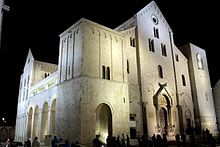Basilica di San Nicola (Bari)
| Basilica of Saint Nicholas Basilica di San Nicola |
|
|---|---|

The Basilica di San Nicola by night.
|
|
| Basic information | |
| Location | Bari, Italy |
| Geographic coordinates | 41°7′48.94″N 16°52′13.01″E / 41.1302611°N 16.8702806°ECoordinates: 41°7′48.94″N 16°52′13.01″E / 41.1302611°N 16.8702806°E |
| Affiliation | Roman Catholic Church |
| Province | Archdiocese of Bari-Bitonto |
| Year consecrated | 1197 |
| Ecclesiastical or organizational status | Minor basilica |
| Status | Active |
| Architectural description | |
| Architectural type | Church |
| Architectural style | Romanesque |
| Groundbreaking | 1089 |
| Completed | 1197 |
The Pontifical Basilica di San Nicola (Basilica of Saint Nicholas) is a church in Bari, southern Italy that holds wide religious significance throughout Europe and the Christian world. The basilica is an important pilgrimage destination both for Roman Catholics and Orthodox Christians from Eastern Europe.
The basilica was built between 1087 and 1197, during the Italo-Norman domination of Apulia, the area previously occupied by the Byzantine Catapan of which Bari was the seat. Its foundation is related to the recovery of some of the relics of St. Nicholas from the saint’s original shrine in Myra, in what is now Turkey. When Myra passed into the hands of the Saracens, some saw it as an opportunity to move the saint's relics to a safer location. According to the justifying legend, the saint, passing by the city on his way to Rome, had chosen Bari as his burial place. There was great competition for the relics between Venice and Bari. The latter won, the relics were carried off under the noses of the lawful Greek custodians and their Muslim masters, and on May 9, 1087, were safely landed at Bari. A new church was built to shelter Nicholas' remains and Pope Urban II was present at the consecration of the crypt in 1089. The edifice was officially consecrated in 1197, in the presence of the Imperial Vicar, Bishop Conrad of Hildesheim, and of numerous bishops, prelates and noblemen. Elias, abbot of the nearby monastery of St. Benedict, was named as first archbishop. His cathedra (bishop's throne) still stands in the church to this day.
...
Wikipedia
